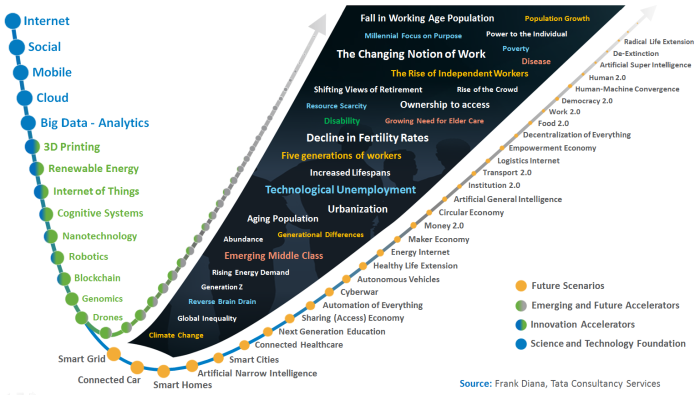In a recent book titled The Future of the Professions, the authors describe an emerging paradigm shift in what I view as The Year of Shifts. They see significant change in the way expertise is made available to society, and envision a time when professionals will no longer be the dominant interface between lay people and the expertise required to address their own particular circumstances. The main hypothesis explored centers on a technology-based Internet society, and increasingly capable machines. These machines operating on their own or with non-specialist users, will take on many of the tasks that have been the realm of the professions. They predict an incremental transformation in the short term, with an eventual dismantling of these traditional professions.
This line of thinking fits with the Structural Change enabler as viewed through the lens of transformation in the digital age. It has prompted me to add another future scenario to my scenario visual, this one labeled “Institution 2.0”.

The authors explore the reasons for this transformed future in considerable depth. They view this future as socially constructive, not disruptive. That’s a great and positive way to look at the broader disruption that lies ahead, and speaks to the ethics discussion needed to steer it towards the constructive path. At the heart of the matter lie the barriers to access collapsing around expertise, knowledge, and wisdom. We are in a phase where we have access to some of these things, but not necessarily the informed guidance that we can act upon – that is likely to change. The authors focus on Education, Healthcare, Law, Divinity, Architecture, Management Consulting, Tax and Audit, and Journalism. I developed this visual to summarize the components of transformation across these professions or institutions. While many of these ultimately may apply to all professions, I focused on the most likely and added some examples:

In addition to these, there are unique drivers associated with each profession. For example, in Healthcare, the quantified-self movement is a key driver of the coming transformation, as are Tele-surgery, Tele-health, Tele-medicine, Genetic Engineering, 3D Printing, and m-Health. In Education, learning management systems, learning analytics, and adaptive learning systems will drive change. In law, we will increasingly see analytics used to predict the results of court decisions, and legal requirements embedded in our environment. In management consulting, AI generated practical expertise will be massively disruptive, as it will for Tax and Audit.
While these are critical components of future transformation, there are fundamental drivers that can apply at a broad level, not just the professions (business, government, etc.). The author’s research suggests that much of what professionals do can be expressed as standard process. Four core trends reflect a move from artisan to process: routinization; disintermediation, re-intermediation, and decomposition. I’ll focus on one, as it has broad implications everywhere. The decomposition of activity into constituent tasks can already be seen at some level in the use of crowdsourcing and the rise of independent workers. As these activities are decomposed, the resulting tasks can be handled in very different ways. Those that can be automated will be automated. The remaining tasks are likely to be multi-sourced and/or handled by the least costly resources (para-professionals as described in the book). The notion of senior people undertaking these constituent tasks will shift to delegation to less-experienced professionals.
The authors identify seven models for the production and distribution of practical expertise. They go into great detail on each model: networked experts, communities of experience, para-professionals, embedded knowledge, machine generated expertise, and knowledge engineering. While no one can predict the future, the authors give us some great food for thought as to the potential path of the professions. As Future Thinking becomes more critical to success, this type of scenario analysis is extremely helpful.
I have long been a believer in structural change at all levels, and our institutions are no exception. So to our future scenario list we add Institution 2.0!

[…] In a recent book titled The Future of the Professions, the authors describe an emerging paradigm shift in what I view as The Year of Shifts. They see significant change in the way expertise is made available to society, and envision a time when professionals will no longer be the dominant interface between lay people… […]
LikeLike
[…] developed in prior centuries do not apply – another example of the breadth of structural and institutional change that we face in this emerging future. Mr. Ross terms this “the weaponization of code” […]
LikeLike
[…] change – which Mr. West explores in the book – has long been a tenet of my work. The future of many of our institutions will either change by our proactive acknowledgement that they must change – or they will be […]
LikeLike
[…] has been funded by 140,000 private donations. This could be an early indicator of a move towards Institution 2.0. It was clear prior to the pandemic that the institutions that form the foundation of society are […]
LikeLike
[…] that support that society are not evolving or changing fast enough. I call this phenomenon Institution 2.0 and track it as a future […]
LikeLike